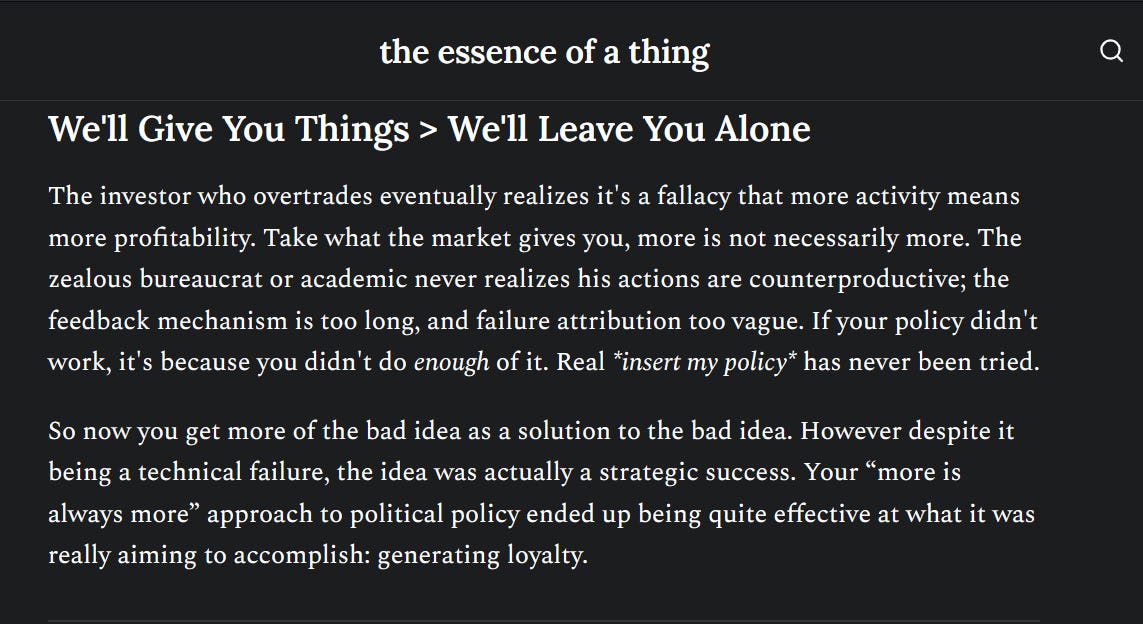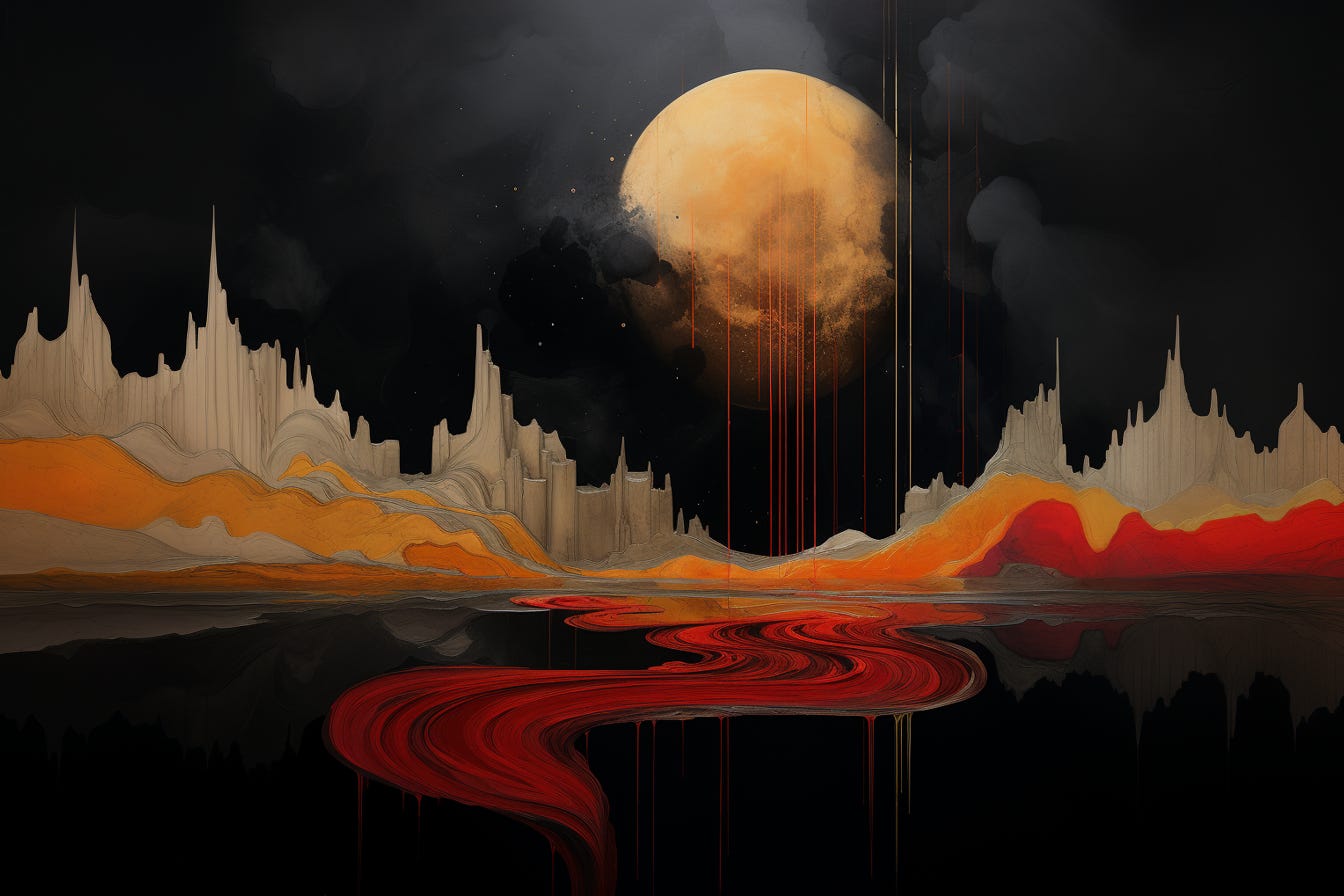Pleasant-Sounding Beliefs and 2nd-Order Effects
1st-order victims and 2nd-order victims. 1st-order freedoms and 2nd-order freedoms.
This may seem based, but it isn’t:
These are the kind of middle-school-tier political stances that contribute to societal malaise and degradation. This superficially agreeable view is the rightwing equivalent of "I believe in equality and social justice". Gosh that sounds nice, who could disagree with such a statement? Unfortunately, your rainbows-and-puppies SJW policy produces DEI neocommunist outcomes. The political left and right are equally susceptible to this kind of thinking. In fact, democracies encourage it.
Political platforms in democracies tend to be motivated by how they make you feel; because feelings and intentions, not outcomes, inform how well it sells to your base. In a democracy the majority rules, and the majority is, by definition, mostly composed of the lowest-common-denominator (LCD).
When victory is determined by the LCD, the messaging must cater to them. It should not be confusing why the best and brightest don’t get into politics; it’s because the best and brightest are not optimized to sell to the LCD, meaning they’re less likely to win elections. The selection effects this produces for candidates and platforms are clear.
To craft policy positions based on outcomes is to commit electoral suicide. Few care about your results, because that would require actual analysis. If the vibes poll well and align with your moral precepts, you’ve got a voter.
From a previous essay, We’ll Give You Things > We’ll Leave You Alone
No Victim, No Crime? What Do You Consider a Victim?
This "no victim, no crime" policy is destabilizing and produces numerous 2nd-order victims at the societal level. Superficial political beliefs don’t see beyond 1st-order effects, and create 2nd-order repercussions that everyone pays for.
Here are some "victimless" crimes:
Drunk driving
Drug use
Insider trading
Public homelessness
There are no immediate victims from any of these. Here's what happens when you allow them unchecked:
Drunk driving penalties are onerous because they act as a society-wide deterrent of behavior that obviously leads to a higher rate of death and injury. Many a stupid drunk-driving decision has been stopped because people know what awaits them if they get caught. Allowing it would create 2nd-order victims by making the act more prevalent: if you only get in trouble when you hurt someone, and not just for doing it, you’d do it more often and assure yourself you’ll just pay closer attention or something while driving. Of course it won't be you who hurts someone driving drunk, it'll be the other guy. You're always super safe.
Hard drug use: I'm not explaining this one. Go look at the 'safe injection' sites in SF and what fentanyl is doing. Everyone who has to be surrounded by the crime and human decay that mass drug use causes is a victim. Grow up.
Insider trading: You degrade integrity and trust in markets by letting big players access inside information and disproportionately profit off it. This potentially reduces investment (growth) as well as market participation, which decreases liquidity, which impedes price discovery. The 2nd and 3rd-order effects of this harms economic growth. When investment is impacted, and growth is reduced, it hurts jobs and a whole host of other positive things nations need to prosper. Victims.
No one is victimized by a homeless guy sleeping on the sidewalk, but what about a homeless encampment along the street near your kids? You get to the latter by allowing the former. We're seeing real time in SF and NYC what this kind of mentality breeds. The 2nd-order effects are spikes in crime and declining living standards for everyone that's around it, creating clear victims.
The rule of "how nice does it sound and how good does it make me feel" political thinking.
1st-Order Freedoms and 2nd-Order Freedoms
Sometimes maximum freedom reduces everyone’s freedom. Sometime restricting freedoms produces more of it.
I met some Singaporeans recently, and it was interesting hearing how they appreciated the militant laws in Singapore. They understood the tradeoff they were making by losing some 1st-order freedoms, but gaining 2nd-order freedoms in the process. On one axis they had less autonomy, and one another one they actually had far more of it.
You’re maximally free in an environment that best facilitates your normal, or preferred, mode of being. For example: Tom Brady is optimized in a highly restrictive environment. A football field has rigid rules for what you’re allowed to do, and there are swift punishments for violations. In this domain Tom performs at peak capacity. It’s how he likes to exist. He actually welcomes this constraining situation, because it's where he's most capable.
I know it’s not a perfect analogy, but this concept is abstractable on a societal level. If you have no desire to operate outside the circle drawn for you, you're maximally free within the circle.
If you're content living inside a circle with unyielding boundaries, you're actually more free than if you lived in a space with no boundaries; because the boundaries almost exclusively only limit others' abilities to act upon you. How much more free are the people of Singapore who can walk wherever they want at night vs those in LA and NYC who can’t do the same? People in LA have more 1st-order freedoms, but far less 2nd-order ones because of the decaying environment it’s produced. Whereas the Singaporean has less 1st-order freedom, but far more 2nd-order ones.
By only focusing on 1st-order victims, Massie would have you believe all that exists are 1st-order freedoms.
Follow @BackTheBunny










Restriction of freedom = More free behavior
Reminds me of a study commonly referred to among us artist/architects. Schoolyard without a fence? At recess the kids stick around the building. Put up a fence and they roam the entire grounds. 👍